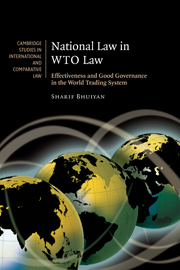Book contents
- Frontmatter
- Contents
- Acknowledgements
- List of abbreviations
- 1 Table of GATT cases
- 2 Table of WTO cases
- 3 Table of other cases
- 1 Introduction
- Part I
- 2 National law in international law
- 3 Systemic WTO obligations regarding national law
- 4 WTO dispute settlement procedures and national law
- Part II
- References
- Index
2 - National law in international law
Published online by Cambridge University Press: 23 February 2010
- Frontmatter
- Contents
- Acknowledgements
- List of abbreviations
- 1 Table of GATT cases
- 2 Table of WTO cases
- 3 Table of other cases
- 1 Introduction
- Part I
- 2 National law in international law
- 3 Systemic WTO obligations regarding national law
- 4 WTO dispute settlement procedures and national law
- Part II
- References
- Index
Summary
Introduction: dualism and monism
It is a customary practice to commence any discussion about the relationship between international and national law by reference to the theoretical debate known as the dualist-monist controversy. While there are a number of different aspects of both doctrines, they derive their appellations – dualism and monism – from their respective viewpoint on the question as to whether international law and national law belong to two separate legal orders or to the same legal order. Dualist doctrine points to differences between national and international law, such as: the subjects of the former are individuals while the subjects of the latter are states; or, while the source of the former is the will of a particular state, that of the latter is the common will of states; or, the fundamental principle that underpins the national system of law is that legislation is to be obeyed, while that of international law is the principle of pacta sunt servanda. For dualists these differences mean that international law and national law are two entirely distinct legal orders existing independently of one another.
By contrast, monist doctrine regards all law – national or international – as part of one single legal structure. This doctrine is put forward either on formalistic logical grounds or from an ethical perspective to assert the supremacy of international law as the best way to protect human rights. From the former perspective it is argued that the same definition of law – as norms that lay down patterns of behavior that ought to be followed – is applicable to both national and international law, and accordingly they cannot but be part of a unified legal structure.
- Type
- Chapter
- Information
- National Law in WTO LawEffectiveness and Good Governance in the World Trading System, pp. 29 - 42Publisher: Cambridge University PressPrint publication year: 2007



